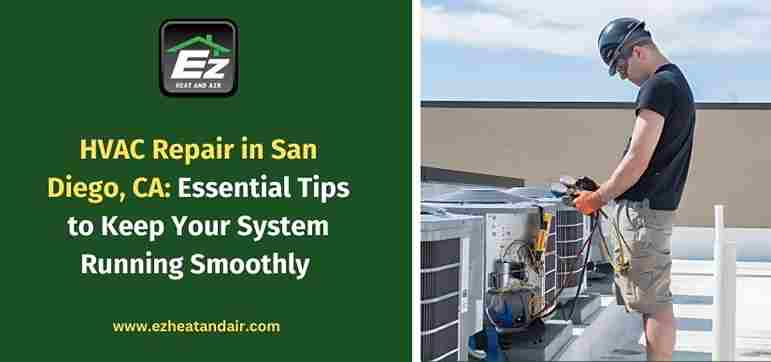HVAC Repair in San Diego, CA: Essential Tips to Keep Your System Running Smoothly
Views : 1797

Regularly replace your air filters.
- Reduced airflow and efficiency.
- Increase the energy bills.
- Causes system strain and lowers indoor air quality.
Keep your outdoor unit clean.
- Remove all clutter from around the unit.
- Wash the condenser coils with a hose, avoiding high-pressure sprays.
- Trim the plants surrounding the unit to allow appropriate ventilation.
Schedule annual HVAC maintenance.
- Inspect and clean the components
- Check the refrigerant levels.
- Lubricate the moving parts.
- Evaluate system performance.
Pay attention to unusual sounds.
- Banging or clanging: Loose or broken pieces.
- Hissing or whistling : Air leaks or refrigerant concerns.
- Squealing : A worn-out belt or motor issue.
Make sure that the thermostat is set properly.
- Replace outdated batteries periodically.
- Check the accuracy of the temperature measurements.
- Installing and running a smart thermostat boosts efficiency and control.
Ensure air is sufficiently flowing throughout your home.
- Make sure no furniture or draperies are blocking anything.
- Air ducts are cleaned regularly for dust and debris removal.
- Seal leaks in ducting to save energy loss.
Monitor your energy bills.
- Dirty filters or coils
- Leaking ductwork.
- Failing components
Avoid overworking your system.
- Set the thermostat to 78°F in summer and 68°F in winter.
- To move air around, use ceiling fans.
- Close the drapes or blinds to limit heat gain.
Address refrigerant issues promptly.
- Warm air comes via vents.
- Ice accumulation on the coils
- Hissing noises near the unit
Know when to call a professional.
- Frequent breakdowns.
- Unusual scents
- Poor indoor air quality.
- Uneven temperatures in your home.
Conclusion
FAQS
Q1. How frequently should I plan HVAC maintenance?
Annual servicing, if not more, should be scheduled in spring or fall. Regular maintenance acts as prevention and assures proper function.
Q2. What tells me that my HVAC system needs repair?
High utility bills, irregular temperatures, strange noises, and frequent cycling are all typical warning signs. If you notice any of these problems, calling in an HVAC technician in San Diego, California, is a necessity.
Q3. How to make the HVAC system more efficient?
Regular maintenance is an easy way to boost efficiency and reduce energy expenditures. This maintenance includes things like properly configuring a programmed thermostat, fixing duct leaks, and cleaning and changing air filters.
Q4. Why was my HVAC system making such loud noises?
Thuds, sweeps, and all manner of obnoxiously loud sounds can be symptoms of loose components, airflow issues, or motor problems. Having a professional evaluate your system is crucial if it is making strange noises.
Q5. Should I replace or get my HVAC system repaired?
If your system is over ten to fifteen years old, not working well all the time, or has lost a major portion of its efficiency, it is definitely better to invest in a replacement rather than short-term maintenance.